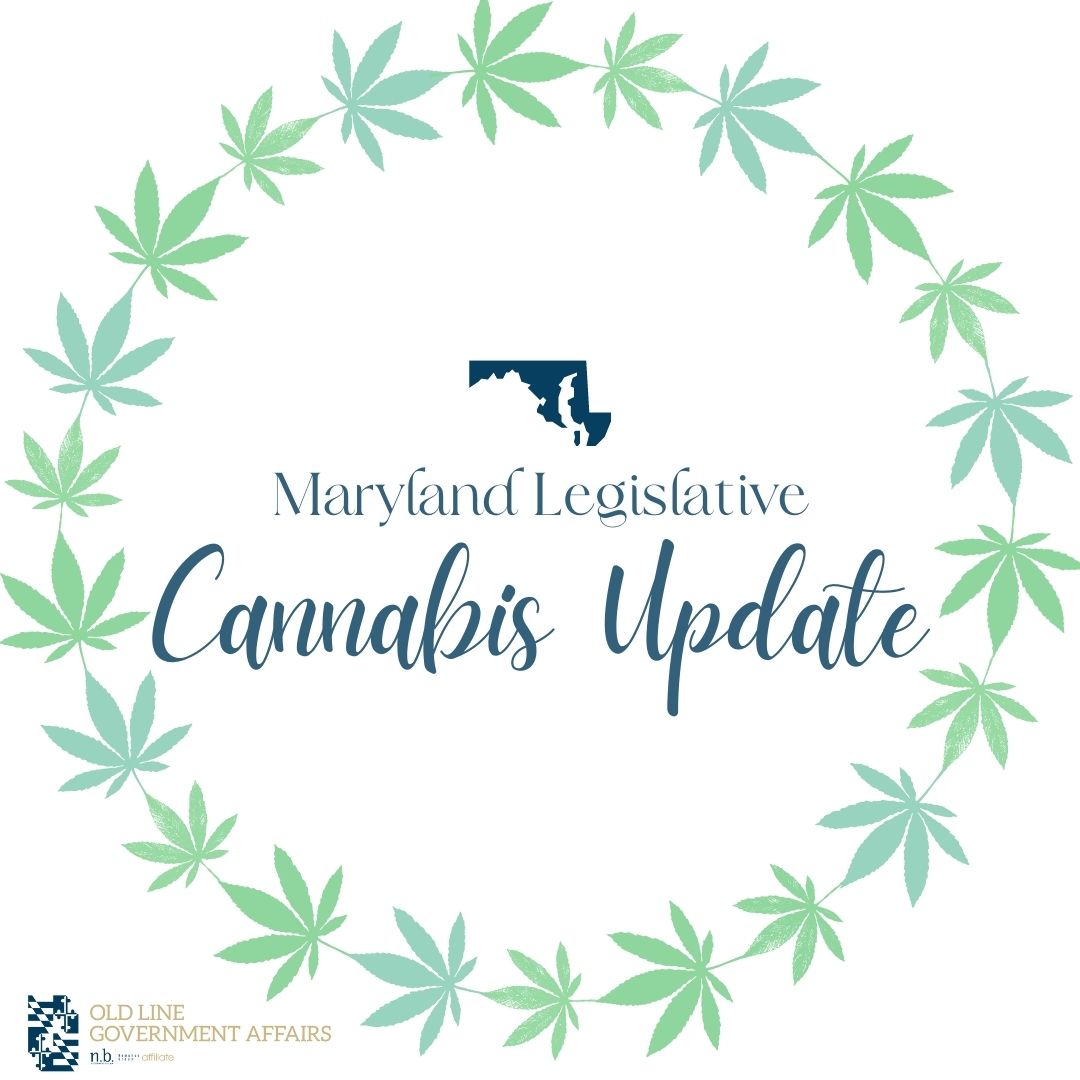A comprehensive look at cannabis-related bills addressed during the current legislative session in Maryland
The road to cannabis legalization in Maryland has been a long and tedious one. Although medical cannabis was legalized in 2014, Maryland did not begin selling medical marijuana to patients who registered with the State until 2017. Recreational legalization has been even slower. The Marijuana Legalization Workgroup, a task force of the Maryland General Assembly, was created five years after the legalization of medical cannabis.
However, there has been progress in legalizing recreational use of cannabis. In 2021, Delegate Jazz Lewis introduced HB32, a bill that would legalize the adult use of recreational marijuana and expunge prior cannabis-related convictions. This bill marked the first time that adult-use recreational legalization was proposed in the Maryland General Assembly. Although the bill did not pass, it became a sign to legislators that recreational marijuana use would soon become an issue of focus.
In addition to recreational marijuana, other cannabis bills regarding medical cannabis, hemp, and other issues are also being brought to this year’s session. While all of these bills might not pass, the volume of bills present at this session is a sign that cannabis is an issue in Maryland that is here to stay.
Although session is still ongoing, there has been progress made on most of these bills. Below is a status update of those bills to keep you informed about what was debated this session and likely to be in the coming years.

House Bill 1, Constitutional Amendment – Cannabis – Adult Use and Possession
Introduced by Delegate Luke Clippinger, this proposed constitutional amendment authorizes an individual at least age 21 to use and possess cannabis in the State beginning July 1, 2023, subject to the requirement that the General Assembly pass legislation regarding the use, distribution, possession, regulation, and taxation of cannabis. This amendment would have to be approved by voters at the next general election which will be held in November 2022. HB 1 has passed the House and has been referred to the Senate Finance Committee for an upcoming hearing.
House Bill 75, Maryland Agricultural Commission – Hemp Industry Member
This bill, sponsored by Delegate David Fraser-Hidalgo, adds a member representing the hemp industry to the Maryland Agricultural Commission, increasing the member count from 29 to 30. The new member is appointed by the Governor from a list of two nominees representing the hemp industry. The bill passed the House and has been referred to Senate Environment and Transportation Committee for an upcoming hearing.
House Bill 351/Senate Bill 333, Income Tax – Subtraction Modification – Expenses of Medical Cannabis Grower, Processor, Dispensary, or Independent Testing Laboratory
This bill, sponsored by Delegate Jheanelle Wilkins in the House and Senator Ronald Young in the Senate, creates a subtraction modification against the State individual and corporate income tax for the amount of ordinary and necessary expenses, including a reasonable allowance for salaries or compensation, paid or incurred during the taxable year in carrying on a trade or business as a State licensed medical cannabis grower, processor, or dispensary or a State registered independent testing laboratory. Subtraction modification may be claimed if the deduction for ordinary and necessary expenses is disallowed under Section 280E of the Internal Revenue Code (IRC). Both bills died in their respective chambers.
House Bill 482, Firearms – Right to Purchase, Own, Possess, and Carry – Medical Cannabis
Sponsored by Delegate Robin Crammer, this bill specifies that a person may not be denied the right to purchase, own, possess, or carry a firearm solely on the basis that the person is a qualifying patient authorized to use medical cannabis. It also prohibits a State agency, for the purpose of approving or disapproving a person from purchasing, owning, possessing, or carrying a firearm, from (1) accessing or using information gathered from a database containing the identities of qualifying patients and (2) inquiring about a person’s status as a qualifying patient. Any form used for the purpose of approving or disapproving a person from purchasing, owning, possessing, or carrying a firearm that inquires about the applicant’s use of controlled dangerous substances must specifically authorize a qualifying patient to refrain from reporting the use of medical cannabis. The bill states that it is the intent of the General Assembly that medical cannabis should be treated as legal for purposes of State law and that the State should not penalize a qualifying patient for using the drug legally. This bill has died in the House after a hearing in the Judiciary Committee.
House Bill 614, Workers’ Compensation – Medical Cannabis – Compensation and Benefits
This bill authorizes the Workers’ Compensation Commission (WCC) to require an employer or its insurer to provide medical cannabis obtained in accordance with State law to an injured employee receiving workers’ compensation benefits as part of the injured employee’s medical treatment. The bill also clarifies that an injured employee could be denied compensation benefits if cannabis was taken but not under the written certification of a certifying provider. The bill was withdrawn by sponsors Delegates Kriselda Valderrama and Lorig Charkoudian.
House Bill 628, Employment – Workers’ Compensation and Workplace Discrimination – Use of Medical Cannabis
This bill, sponsored by Delegate Karen Lewis Young and others, prohibits an employer from discriminating against an individual who is legally authorized to use medical cannabis or tests positive for specified cannabis components or metabolites if the individual is legally authorized to use medical cannabis. It also authorizes the WCC to require an employer or its insurer to provide medical cannabis to an injured employee receiving workers’ compensation benefits as part of the injured employee’s medical treatment. The bill received an unfavorable report by the Economic Matters Committee.
House Bill 837, Cannabis Reform
Another bill sponsored by Delegate Luke Clippinger, HB 837 renames marijuana as “cannabis” and makes corresponding changes, and requires specified agencies and entities to complete studies, collect and report data, and develop specified standards regarding the use of cannabis, the medical cannabis industry, and the adult-use cannabis industry. The bill also alters civil/criminal penalties related to cannabis, authorizes specified resentencing and release of individuals convicted of use or possession of cannabis, alters expungement provisions, and establishes the Cannabis Business Assistance Fund, the Cannabis Public Health Fund, and an advisory council. The Maryland Medical Cannabis Commission (MMCC) must complete a baseline study, collect and report data from MMCC licensees, and complete a study on home grow programs. HB 837 has already passed the House and is now being heard in the Senate Finance Committee.
House Bill 1078/Senate Bill 788, Cannabis – Regulation – Delta-8- and Delta-10 Tetrahydrocannabinol
An emergency bill crafted by Delegate Joseline Pena-Melnyk, this legislation specifies that a hemp product does not include and marijuana does include any product (1) made through a process that includes the use of hemp and (2) that contains a concentration of 0.3% or greater of delta-8- or delta-9-tetrahydrocannabinol (THC) concentration on a dry weight basis and is intended for a use that is regulated by the MMCC. It also prohibits a person, under the Hemp Farming Program or Maryland Hemp Research Pilot Program, from knowingly producing plants or any part of a plant, that exceeds a delta-8-THC concentration of 0.3% on a dry weight basis in addition to other prohibitions in current law. A definition of medical cannabis and its inclusions and exclusions is also established. Both bills passed their respective chambers and crossed over, with HB 1078 being assigned to the Senate Finance Committee and SB 788 to House Health and Government Operations for an upcoming hearing.
House Bill 1295, Multifamily Dwellings – Smoking Policies
This legislation requires a landlord or the governing body of a condominium or cooperative housing corporation to develop a smoking policy if the property is a multifamily dwelling. After passing the House, the bill has now been assigned to the Senate Judicial Proceedings Committee for an upcoming hearing.
House Bill 1325/Senate Bill 772, Child in Need of Assistance – Neglect – Marijuana Use
If passed, this bill would alter the definition of “neglect” in statutory provisions that govern child in need of assistance (CINA) proceedings. It also specifies that neglect does not include the use of marijuana by any parent or individual who has permanent or temporary care or custody or responsibility for supervision of the child unless, as a result of the use of marijuana (1) the child’s health or welfare is harmed or placed at substantial risk of harm or (2) the child has suffered mental injury or been placed at substantial risk of mental injury. While HB 1325 died in the House, SB 772, sponsored by Senator Jill Carter, passed the Senate and has an upcoming hearing in the House Judiciary Committee.
House Bill 1342, Cannabis – Legalization and Regulation (Cannabis Legalization and Equity Act)
This bill legalizes marijuana (which is renamed cannabis) for individuals at least age 21. It establishes a regulatory and taxation framework for cannabis establishments within the Maryland Department of Labor (MDL), authorizes a local regulatory framework subject to specified limitations, and establishes a process for dismissal of or postconviction relief for marijuana-related offenses and expungement of the dispositions of marijuana-related charges. This bill did not make it out of the House Judiciary Committee.
House Bill 1478, Hemp Farming Program – Use of Hemp and Hemp Products in Consumable Products
The proposed legislation alters the definition of “hemp” and “hemp product” in provisions of law relating to the Hemp Farming Program, and authorizes a person that produces hemp or a hemp product in accordance with the Program to include the hemp or hemp product in consumable products for sale by the person if the product is tested by an independent testing laboratory to ensure the product meets applicable safety standards and the total tetrahydrocannabinol concentration of the hemp product does not exceed 1% on a dry weight basis. This bill did not make it out of the House Rules and Executive Nominations Committee.
Senate Bill 286, Firearms – Use of Medical Cannabis
Previously introduced in the 2020 Legislative Session, this bill specifies that a person may not be denied the right to purchase, possess, or carry a firearm solely on the basis that the person is authorized to use medical cannabis. SB 286 has passed the Senate and is now scheduled for an upcoming hearing in the House Judiciary Committee.
Senate Bill 628, Medical Cannabis – Grower License – Number and Licensed Processors
This bill (1) authorizes the MMCC to issue up to 42 (rather than 22) medical cannabis grower licenses; (2) authorizes a grower to operate in a facility that does not exceed 10,000 square feet; (3) specifies how a licensed processor may apply for licensure as a medical cannabis grower; and (4) requires MMCC, to the extent authorized under federal or State law, to actively seek to achieve racial, ethnic, gender, and geographic diversity when licensing processors as growers and encourage processors who qualify as a minority business enterprise (MBE) or as a small, minority, or women-owned business entity to apply for licensure as growers. In addition, beginning October 1, 2022, and annually thereafter, a processor licensed as a grower must report specified information to MMCC. A processor licensed as a grower may operate in a facility that does not exceed 25,000 square feet and is subject to the licensed grower requirements. MMCC must adopt regulations to implement the bill. SB 628 died in the Senate.
Senate Bill 684, Vehicle Laws – Drugged Driving – Oral Fluid Tests
This legislation would authorize a police officer who has reasonable grounds to believe that an individual is or has been driving or attempting to drive a motor vehicle while impaired by a controlled dangerous substance (CDS) to request that the individual provide an oral fluid sample to be tested by a police officer who is a certified drug recognition expert. Additionally, the results of the oral fluid test may not be used as the only guide for a police officer in deciding whether charges should be filed or as evidence in any court action. If the results of an oral fluid test indicate the presence of a specified amount of cannabis, the law enforcement agency must provide notice to the Motor Vehicle Administration (MVA) of the results of the test. On receipt of this notice, MVA must (1) for a first offense, suspend the driver’s license for 45 days or (2) for a second or subsequent offense, suspend the driver’s license for 90 days. This bill died in the Senate Judicial Proceedings Committee.
Senate Bill 692, Cannabis – Legalization and Regulation (Cannabis Legalization and Reparations for the War on Drugs Act)
This bill legalizes marijuana (which is renamed cannabis) for individuals at least age 21. It also (1) establishes a regulatory and taxation framework for cannabis establishments within the Alcohol and Tobacco Commission; (2) establishes special funds for specified purposes; (3) expands the funding for and purposes of the existing Small, Minority, and Women-Owned Business Account (SMWOBA); and (4) establishes a process for dismissal of, expungement for, or postconviction relief for marijuana-related offenses. The commission must evaluate the cannabis market in the State by January 1 each year beginning in 2025 and must commission a study of supply and demand for the cannabis market by January 1, 2027. SB 692 died in the Senate after its hearing in the Finance Committee.
Senate Bill 722, Medical Cannabis – Licensees – Ownership Limitation Exemption
This proposed legislation specifies that an “ownership interest” (as it applies to businesses licensed by the MMCC) does not include the ownership interest in a licensed grower, processor, or dispensary (or a direct or indirect parent company of a specified licensee) through owning publicly traded securities of a specified licensee that are (1) less than 5% of voting shares or (2) nonvoting shares. MMCC must adopt or amend regulations in accordance with the bill. This bill died in the Senate after its hearing in the Finance Committee.
Senate Bill 833, Cannabis – Legalization and Regulation
This proposed constitutional amendment authorizes an individual at least age 21 to use and possess cannabis in the State beginning July 1, 2023, subject to the requirement that the General Assembly provide by law for the use, distribution, possession, regulation, and taxation of cannabis. It (1) renames marijuana “cannabis”; (2) establishes a regulatory and taxation framework for cannabis establishments within the Alcohol and Tobacco Commission; (3) establishes provisions related to social equity in the legal cannabis industry; and (4) establishes a process for dismissal of or postconviction relief for marijuana-related offenses and expungement of the dispositions of marijuana-related charges. Not subject to the ratification of the proposed constitutional amendment, the commission, in consultation with specified entities, must complete two disparity studies by April 1, 2023, and by January 1, 2025, respectively. Since this is a proposed constitutional amendment, it would have to be approved by voters at the next general election. This bill died in the Senate after its hearing in the Finance Committee.
Senate Bill 844, Medical Cannabis – Dispensaries – Operation at Multiple Locations
This bill authorizes the holder of a dispensary license to operate at up to four locations. An applicant for a dispensary license must provide the number of locations the applicant intends to operate and the physical address of each location. A licensed dispensary that operates at more than one location must provide specified data in its quarterly report to the MMCC for each location operated under the license and in aggregate for all locations operated under the license. SB 844 died in the Senate after its hearing in the Finance Committee.
Senate Bill 1006, Hemp Farming Program – Use of Hemp and Hemp Products in Consumable Products
This legislation alters the definition of “hemp” and “hemp product” in provisions of law relating to the Hemp Farming Program and authorizes a person that produces hemp or a hemp product in accordance with the Program to include the hemp or hemp product in consumable products for sale by the person if the product is tested by an independent testing laboratory to ensure the product meets applicable safety standards and the total tetrahydrocannabinol concentration of the hemp product does not exceed 1% on a dry weight basis. This bill is scheduled for an upcoming hearing in the Senate Education, Health, and Environmental Affairs Committee.




